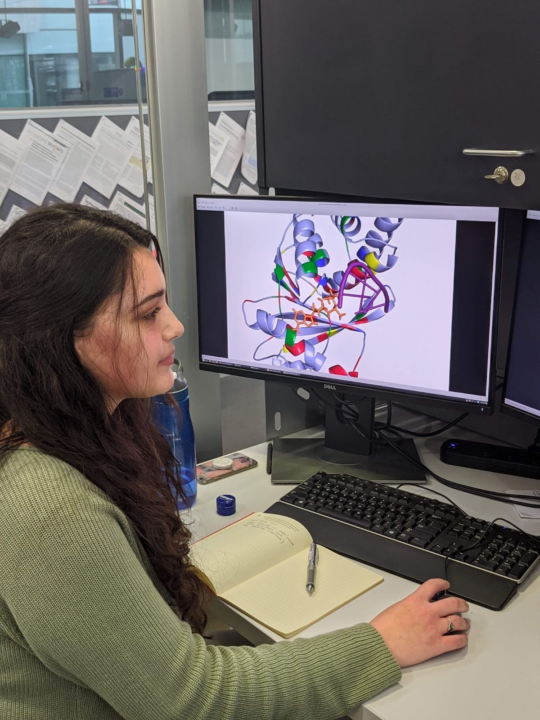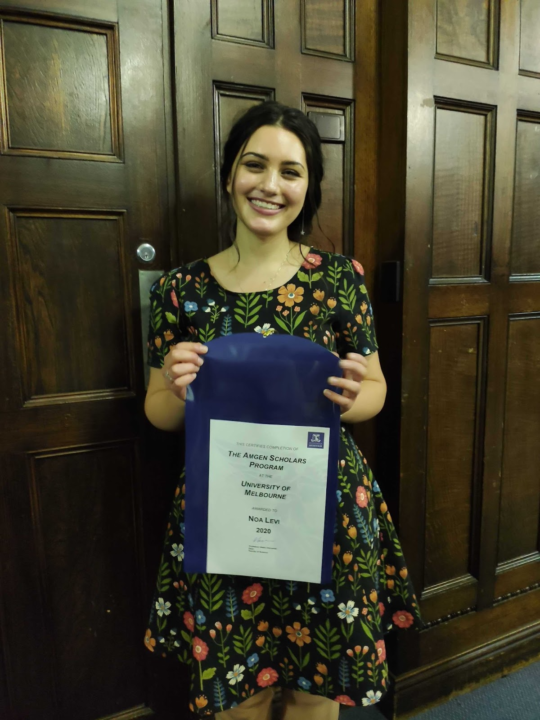
Combining Math with Biology on a Research Path
For Noa Levi, the Amgen Scholars Program was the first time she saw scientific research in a way that “didn’t look like the stock photos of someone in a white lab coat holding a pipette and a test-tube.” Having the opportunity to conduct hands-on research at the University of Melbourne right before the pandemic hit was a game changer to Levi, who was studying math at the University of Wollongong at that time.
“Through Amgen Scholars, I learned how valuable mathematical and statistical tools could be in scientific research,” she says. “I think the program helped prepare me for my current work by showing me that a career combining math and science was even an option. It was also the first step in realizing that I at least shouldn’t rule out a research career given how much I enjoyed going to the lab every day and working on my project.”
Now pursuing a PhD at Queensland University of Technology in Brisbane, Levi uses her math skills every day to study the effects of pharmacological drugs in biological systems with robust perfect adaptation (RPA). This regulation strategy allows living systems to adapt to changing environments and maintain vital functions.
The work has resulted in some counterintuitive findings, Levis says, such as that many commonly used drug types have no effect on RPA, while lesser used ones have a stronger effect on these particular systems. “It’s thought that RPA may be a factor in why some treatments fail, especially in the context of cancer, and so we hope that our research can contribute to the development of effective treatments,” she explains.
Three years ago, Levi says that she would not have imagined she would eventually pursue a PhD. After completing her undergraduate program in 2020, having to work online to finish her degree due to the pandemic, she did not have a clear idea of what to do next. From her Amgen Scholars experience, she knew that she enjoyed research but was hesitant to pursue a research career. “I had this notion that full-time research would be too stressful and I would just be working 24/7 and wouldn’t have a life outside of work,” Levi says. “I’m happy to report that I’ve been proven wrong!”

Levi moved to Queensland University of Technology, close to her family, for an honors year, where she would first learn about RPA. “It ended up being the most enjoyable year of study for me since I started university,” she says. “I found the research itself so interesting, and the icing on the cake was that I had two wonderful supervisors (Dr. Robyn Araujo and Dr. Adrianne Jenner), who were so supportive and encouraged me to continue with research and to start a PhD.”

In addition to the Amgen Scholars Program preparing Levi for her research path, Levi has many wonderful memories from the Program. “I really enjoyed joining a research group and learning about the kinds of problems everyone was working on and then getting into a really interesting project of my own with the help of the lab head and some of the PhD students in the group,” she recalls. “Spending weekends with the other scholars exploring Melbourne was definitely a highlight too. I met so many wonderful people during the program and am so grateful for the experience.”
To the new cohort of Amgen Scholars, Levi advises: “Don’t be afraid to reach out, even to people you haven’t personally met. This might be to teachers, employers, supervisors or people whose work you are interested in. I’m quite a shy person, so I really relate to the feeling of not wanting to bother people by asking for help or advice or opportunities, but I’ve so often been surprised by people’s kindness and willingness to help.”

